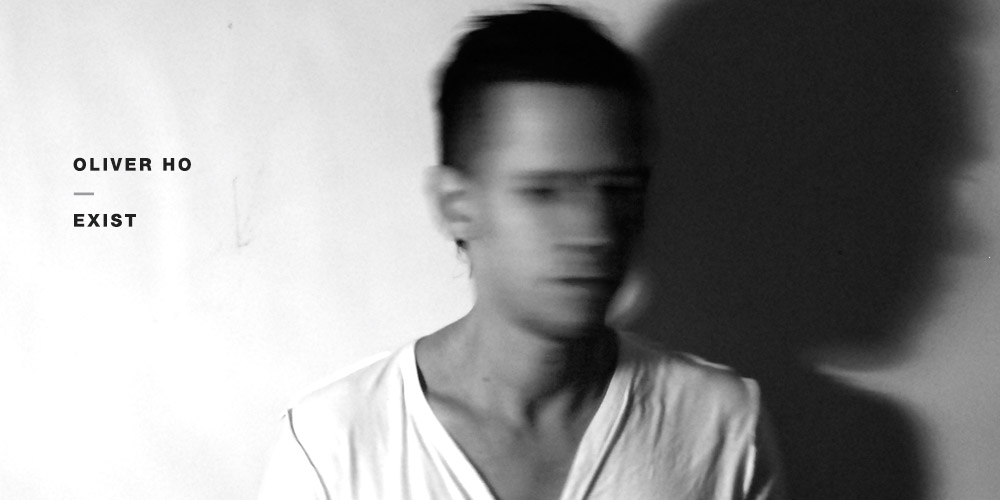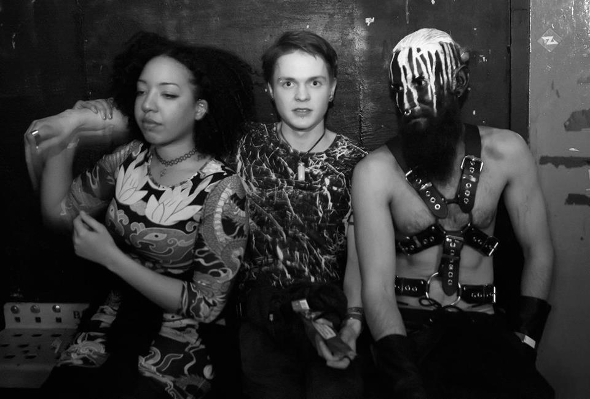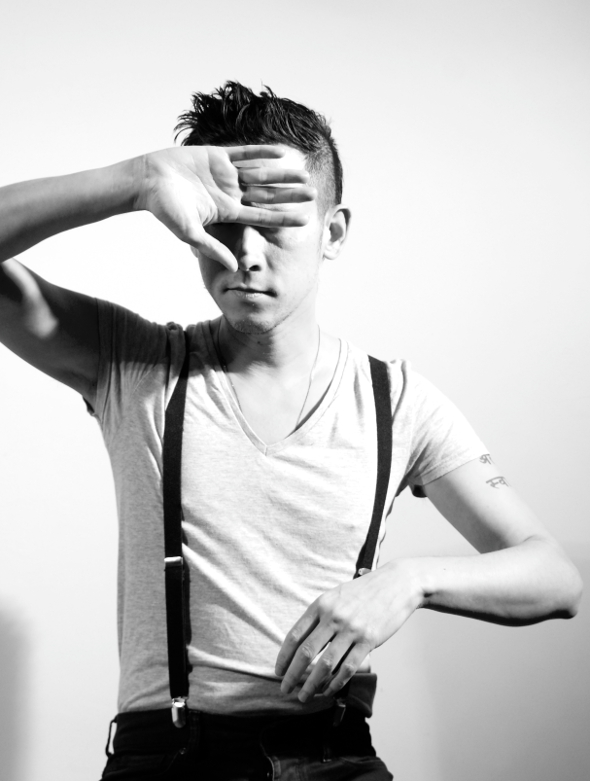Oliver Ho: Exist

James Manning unknowingly enters the uncanny world of Oliver Ho’s Broken English Club.
If you were in London on the morning of March 20 you would have missed the solar eclipse like everyone else thanks to that thick grey blanket of cloud masking the celestial phenomenon. Still, with a new moon on show for the weekend, so were the freaks, some of which were present the following night at Angel venue Electrowerkz. Oliver Ho was headline DJ for London party KAOS, a ten-year-old event steeped in florid fetish, S&M and polysexual concerns. The dancefloor played host to leather-capped-and-strapped men, gimp masks and queens, to smatterings of lesbian foreplay, gothic ravers, and techno heteros. By and large, the lurid dress, appearance and confidence of these industrially minded club-kids reflected a demeanour not far off the antics of performance artist, fashion and pop culture eccentric Leigh Bowery.
Ho opened his set with the rocky back-beat and howling wolf of “Channel 83” from his Scars EP, the latest record he’s made under his prevailing alias, Broken English Club. Ho’s set later incorporated Thomas Bangalter’s “Outrun” (a track wholly embraced by UK techno VIPs Ben Sims, Surgeon and James Ruskin), to Fachwerk material, sizzling Emptyset sounds and Rrose’s epic “Waterfall (Birth)”. It was here that a side, a visceral aesthetic, of Ho’s music, channelled through the motifs of Broken English Club, came to the fore, and this, it felt, was fuelled by a queer synthesis of sexual liberty, glamour and art fused by the warehouse grit of punk, synth wave and noise inspired techno.
“Broken English Club, like a lot of names I have used in the past, is a way for me to create a world that the music exists in,” Ho says. “A place that could be disgusting and fascinating at the same time; that’s more interesting to me than futuristic utopian ideas, or ideas of superior technologies.” Following our first meeting earlier that week at one of London’s oldest establishments, Gordon’s Wine Bar, my experiences with Ho, in hindsight, felt like being in a world combining elements of An American Werewolf in London with Omega Man and Mars from Total Recall.
 This probably pleases Ho, whose artistic interests outside of music lie in film and painting, and he mentions the soundtrack of Eraserhead and work of Matthew Barney (River Of Fundament) as influential. “He created a six-hour film about the Egyptian afterlife which is amazing, it’s a grueling and fascinating experience to sit through something that long in the cinema, but you come out of it with something unusual and new.” Ho explains the thought of death (to be so blunt), “doesn’t seem morbid to me, it’s just something that’s so unknowable and abstract.”
This probably pleases Ho, whose artistic interests outside of music lie in film and painting, and he mentions the soundtrack of Eraserhead and work of Matthew Barney (River Of Fundament) as influential. “He created a six-hour film about the Egyptian afterlife which is amazing, it’s a grueling and fascinating experience to sit through something that long in the cinema, but you come out of it with something unusual and new.” Ho explains the thought of death (to be so blunt), “doesn’t seem morbid to me, it’s just something that’s so unknowable and abstract.”
In 2004 he released the one album as Veil. “It was a self contained thing,” he begins, “all the tracks felt like they worked as a whole and created a world,” Ho says. “I used an image of an execution chamber for the artwork… A lot of the ideas were about the veil between life and death, and transformation, what occurs to the spirit at death,” Ho explains.
Oliver Ho’s music under his own name is as synonymous with UK techno as what’s been produced by the Surgeon, Regis, Sims, Ruskin et al. Over the past decade, however, Ho’s artistic direction has deviated away from the Jeff Mills-inspired loops he and the aforementioned made their name making (as have the others in varying degrees), and Ho’s two labels, Light and Dark, and Meta, once released the type of techno comparable to what came out on Counterbalance and Cosmic. Around 2006, Ho began developing the alias he’s most commonly associated with today, Raudive – that was until Jealous God unleashed the music of Broken English Club.
“I want to create something that destroys me,” Ho says. “I feel by using a name (alias) it makes the ideas more vivid and allows them to breathe and have a character.” Furthermore, adding philosophical nuance to Broken English Club is the dystopian fiction of J.G. Ballard. “He creates these suburban places that are totally banal and dull and also full of mystery and violence at the same time,” Ho says, a comment, for me, made all the more poignant after experiencing the salacious attitudes of KAOS beneath the bourgeois suburbia of Angel.
Is Broken English Club the ‘next step’ from Raudive, then? “Where I am at right now, it’s what I want to put into the world, it’s how my mind is working,” Ho responds. “I make my musical decisions without thinking too much, but as things start to materialise more vividly I am able to shape things and step back and consciously paint a picture of a place I want to go,” he says. “The Broken English Club stuff is much more about a relentless pulse, it’s not funky, really, it’s noisy, some of it is heavier, it’s bleaker and darker.”
 There’s an affinity attached to the music of Raudive and Broken English Club, although Broken English Club, at the moment, feels more defined, and both projects are related Ho says. “I put a lot of similar ideas into everything I do, I am obsessed with the human voice and using it, and I am obsessed with certain types of reduced beats or groove.” Ho further explains that Raudive, still active, is “more involved with exploring a lot of house ideas, and fusing them with a psychedelic techno atmosphere.” He adds, “I really wanted to create stuff that had an organic quality, but with a weird electronic, chaotic element to it.”
There’s an affinity attached to the music of Raudive and Broken English Club, although Broken English Club, at the moment, feels more defined, and both projects are related Ho says. “I put a lot of similar ideas into everything I do, I am obsessed with the human voice and using it, and I am obsessed with certain types of reduced beats or groove.” Ho further explains that Raudive, still active, is “more involved with exploring a lot of house ideas, and fusing them with a psychedelic techno atmosphere.” He adds, “I really wanted to create stuff that had an organic quality, but with a weird electronic, chaotic element to it.”
“The album I did (as Raudive) called A System Of Objects was like a fictional, exotic place full of tribal, electronic music,” Ho explains, “I still want to explore that place.” Broken English Club, on the other hand, is a road to discovery, somewhere to explore different ideas, and, “everything is coming out a bit darker and harder edged,” Ho feels. “I want to push into some new territories, more noise, more drums, more vocals.”
“My output in the late-‘90s and early-2000s was pretty fast and dense,” Ho retains. “I didn’t want to repeat ideas endlessly, I wanted to slow things down, inject space into my music, allow things to breathe.” Broken English Club’s direct musical influences stem from groups like Sunn O))), Coil and Godflesh, tells Ho, and he says, “the best music is psychedelic, in that it changes perception, whether that’s punk, metal, techno, jazz or something else.”
“If I can draw from these things that influence me and make sense out of them, then it feels much more personal and unique,” Ho believes. “I also love the relentless feeling of bands like The Fall and Suicide, it’s like their songs can just go on forever, very much like techno, there’s a lot in common with them.” And as Ho concludes, be it Jeff Mills or David Lynch, “in a way, we are all the bastard sons of the things we love.”
The first person to really embrace Broken English Club’s sound and aesthetic was Juan Mendez, aka Silent Servant. “He really understood it, he could relate to it, and saw where I was coming from and how I wanted it to relate to techno,” Ho says. “He really gave me a lot of encouragement, and I felt maybe there was a lot of potential in the project,” he adds. “Juan’s great at nurturing new ideas and talent and I think you can see that with how Jealous God is progressing.”
Jealous God was launched by Mendez, James Ruskin and Karl O’Connor in 2013 and in a way the music, although distinctly different, fills a void left by the closure of Sandwell District. Where Sandwell District was streamlined and semi-anonymous, Jealous God is grungy and full of character, loud and proud. Veronica Vasicka’s Cititrax, sub-label to her main outlet Minimal Wave, also saw promise in Ho’s work as Broken English Club – as she did with Lee Douglas’s burgeoning An-i project – and was responsible for the release, and suitably provocative artwork, of Ho’s BDSM-laced Scars EP.
Today, the original loopy techno of Oliver Ho made between 1996 and 2006 remains music to be dug up by the techno archivist. Ho does, however, plan to reissue material from his labels, including Mike Parker’s Light and Dark Part Four EP from 2002. Ho states, “I am a different person and I make different music,” while adding, “I may do some remixes of early stuff at some point too, but it won’t sound exactly like my ‘90s material… What’s the point of that…” Ho’s Zov Zov collaboration with long time friend Tommy Gillard is something the two have been working on for close to a decade I’m told, but to date they’ve only released the one 10” on Avian sub-label Mira.

“We just want to do it, because we want it to exist,” Ho says, “we have a lot of material, which I am sure will see the light of day over time, but it needs to be done in the right way.” Ho adds, “if I have time, I will put some of it out myself.” In 2001, Ho released the Exist compilation, featuring off the wall productions by Anthony Child, Steve Bicknell and Mick Harris, the late Richard Polson, and Nick Dunton, to Claude Young and Fumiya Tanaka. The compilation, giving us the single Karl And The Curbcrawlers track, was released on a label Ho set up as a platform hoping to facilitate multifaceted arts and media projects covering film, music and photography, with its launch taking place at a cinema in Bristol.
More Broken English Club 12”s are on the way though, and an eventual album is said to be in the works. “It’s all coming together, it will be a big ongoing project for sure,” Ho confirms. “I want to do some different live shows, some techno, but also some with more live instruments, perhaps bringing in guest musicians,” he adds. “I already do live vocals and some live electronic percussion in my shows, I enjoy the energy of that,” Ho explains, and he says it’s a way of making performances unique, more improvisational. “I want to see how it can manifest itself in different forms and different environments,” he adds. “It keeps me sane, it keeps me hungry.”
Ho’s connection with punk, rock, noise, or as the techno world calls it, guitar music, shouldn’t come as a surprise. With Zizi Kanaan, Ho forms The Eyes In The Heat, an indie, synth poppy inspired band that may be a little too abstract for a label like French fashion house Kitsune, but perfect for Chloé Thevenin and Ivan Smagghe’s Kill The DJ. The pair released their album, Program Me, on the label in 2012, and Ho explains how “some pop music can be catchy and fucked up at the same time,” just like how “Detroit or rave stuff can sound cheesy and psychotic.”
 “I guess a lot of my music is a contradiction because I am looking to get out of my head: I want to lose myself,” he says. Ho’s painting (Exume, pictured left) lends itself to escapism too, “it’s completely non-electronic,” he points out. “It’s very healthy for me to spend time out of the studio working with basic materials, nothing that needs electricity.” Basic as his materials may be, some are harder to find than others, as Ho found out. “I was recently searching the internet to buy extracted human teeth to use in my paintings but I found out they were classed as a biohazard.”
“I guess a lot of my music is a contradiction because I am looking to get out of my head: I want to lose myself,” he says. Ho’s painting (Exume, pictured left) lends itself to escapism too, “it’s completely non-electronic,” he points out. “It’s very healthy for me to spend time out of the studio working with basic materials, nothing that needs electricity.” Basic as his materials may be, some are harder to find than others, as Ho found out. “I was recently searching the internet to buy extracted human teeth to use in my paintings but I found out they were classed as a biohazard.”
Like a science fiction movie I found myself stood at the neon-lit bar of Elektrowerkz unable to elude the thought that where I am is far from the world I normally inhibit. Looking back, it becomes all the more clear a cultivated sound and aesthetic, when embraced by the right people in a fitted setting, can in fact create an ulterior universe, if only for a few hours. Having the ability to do this is what separates the music of an artist from a producer, and Ho’s art form, as he explains, exists at a cross roads. “A place that connects different worlds,” he says, “the world of energy and rhythms, and a bleak place that has a kind of broken, empty feeling.”
“From a simple point of view it appears that it’s all about the dancefloor and club tracks, but there’s more and more grey areas that seep into this experience, “ Ho says of his music. “It becomes something that’s bigger and less about a single set of rules,” he says. “Things start to materialise more vividly and I’m able to shape things and step back, and consciously paint a picture of a place I want to go. It’s all about that ultimately, taking people to internal places, altering reality.”
James Manning
Image from KAOS courtesy of Elena Rostunova
Image of Scars EP discs courtesy of Minimal Wave
Image of Exume painting courtesy of Oliver Ho